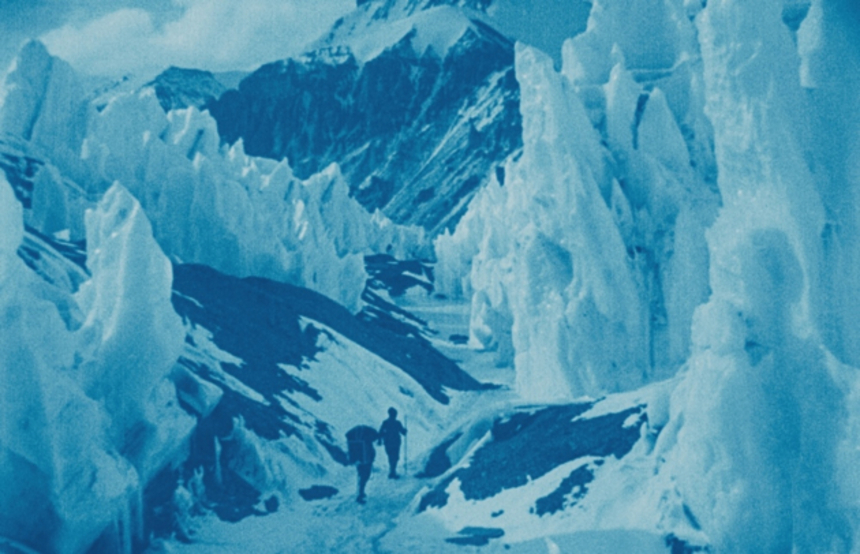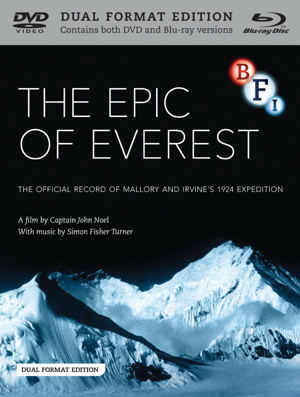Blu-ray Review: Capt. John Noel's THE EPIC OF EVEREST From The BFI

The ill-fated 1924 attempt to reach the peak of Mount Everest was an incredibly politically charged undertaking, with British authorities desperate to reaffirm the country's superiority as a world force after recent attempts to be the first nation to reach both the North and South Poles had failed. An earlier attempt to reach the highest point on Earth two years previously had also ended without success, but mountaineer George Mallory was determined to try again.
As with the previous attempts, the 1924 expedition was financed by the Royal Geographic Society and the Alpine Club, together with a sizeable contribution from Captain John Noel, in return for securing all photographic rights to the expedition. During his years with the British army in India, Noel had spent time in the Himalayas, even venturing into Tibet in disguise in order to get close to and photograph Mt. Everest, what the locals called Chomolungma - The Goddess of the World. After lecturing about Everest for the Royal Geographic Society, he had accompanied the earlier 1922 attempt, and was determined to return and capture the first successful ascent on camera.
The Epic of Everest is the resulting cinematic document, shot, directed and edited by Noel in an effort to chronicle this incredible feat of mountaineering and human endeavour. Little did he realise that what he would also film was a story of great tragedy, and the climax of the ascent - and therefore his film - would lend the expedition an entirely different kind of notoriety than had been intended.
Back in 1924, the Kingdom of Nepal was isolated and forbidden to westerners, meaning that the expedition party was unable to take the easier, more direct route to the top that is commonly navigated today, but instead had to travel north through India and onto the Tibetan plateau, ascending Everest from the North. Tensions were high between Britain and Russia over control of the Dalai Lama-governed Tibet, while weather conditions were incredibly hostile, leaving just a short 8-week window between the harsh winter and violent monsoons for the climbers to complete their mission.

Unlike Herbert Ponting's earlier film charting Robert Falcon Scott's equally tragic attempt to be the first man to reach the South Pole, Noel's film appears less interested in documenting the specific route of the expedition or giving insight into the participants and their individual struggles along the way. Instead, Noel takes a step back from the human element to marvel at the natural surroundings. Noel's shots of the majestic mountains and ice formations around the explorers are truly astonishing, creating a trepidatious atmosphere that underscores the sense of achievement and the gravity of the accomplishments we are bearing witness to. He is also able to throw valuable light onto the lifestyles and overwhelmingly cheerful demeanour of the local Tibetan population. Living at such punishingly high altitudes they endure inconceivable hardships, yet display a universal humanity and joie de vivre that betrays their exotic, otherworldly appearance.
Much praise is given to the climactic final shot of Mallory and Irvine, as they disappear into the wind and snow, apparently caught on film from a distance of 2 miles away. Noel assembled his own camera equipment in order to accomplish that and many other shots, and while there is a lingering eeriness to the moment, it could have been accentuated had we known more about the two men in the lead up to their disappearance. That said it should be noted that Mallory had objected to the expedition being filmed at all, and was likely unwilling to share personal insights with Noel or his camera. Thankfully, a new percussive score from Simon Fisher Turner adds a welcome layer of emotion to the final viewing experience.
Very much a companion piece to Ponting's The Great White Silence, which Noel himself cited as a major influence on his own work, The Epic of Everest deserves its place as an invaluable time capsule of a bygone era, but also as one of the first great nature documentaries and a testament to Earth's fearsome beauty. The BFI has done an incredible job restoring the picture to its former glory, and the disc's bonus features shed plenty of light on the restoration process, involving colour tinting and judder reduction, as well as new recordings of the original orchestral score from the film's 1924 debut, and an interview with Turner about his excellent music. The result is a gorgeous looking release that should help preserve and proliferate a film of lasting historical and cultural significance, that is also a thrilling story of courage and sacrifice in the quest to explore the unknown.
The Epic of Everest is available from the BFI on dual format Blu-ray/DVD now
The Epic of Everest
Director(s)
- J.B.L. Noel
Cast
- Andrew Irvine
- George Mallory

Do you feel this content is inappropriate or infringes upon your rights? Click here to report it, or see our DMCA policy.






